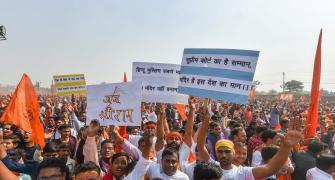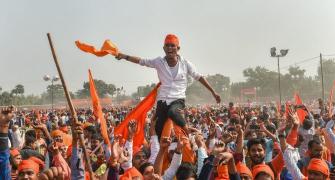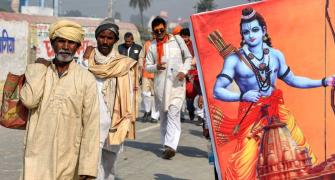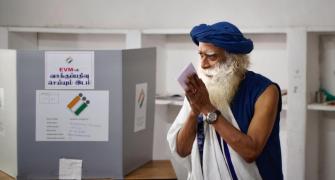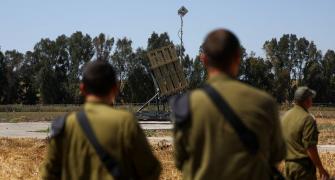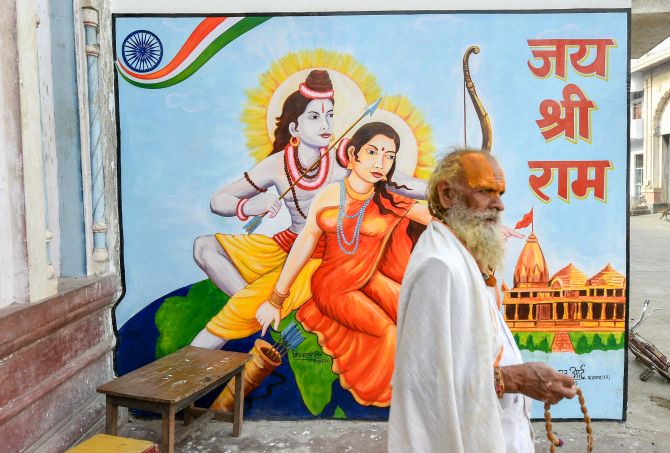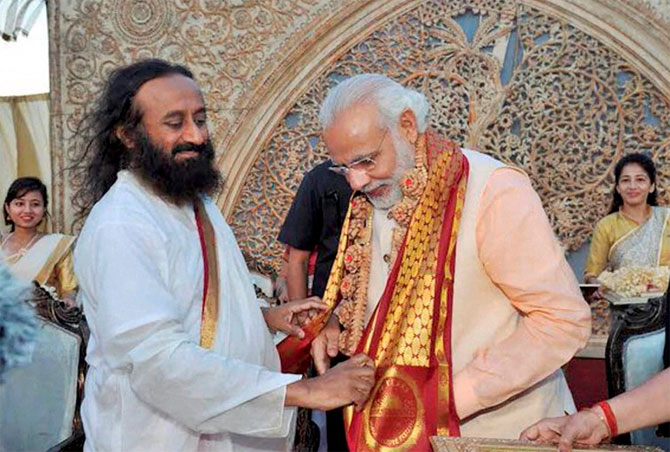The Supreme Court on Friday said it will hold day-to-day hearing from August 6 to decide the politically sensitive Ram Janmabhoomi-Babri Masjid land dispute in Ayodhya as the efforts to arrive at an amicable settlement through mediation have failed.

The apex court took note of the report of the three member mediation panel, headed by former apex court judge FMI Kalifulla, that the mediation proceedings which went on for about four months have not resulted in any final settlement and it has to decide the matter pending before it.
"We have received the report submitted by Justice (Retd) F M I Kalifulla, the Chairman of the Mediation Committee. We have perused the same. The mediation proceedings have not resulted in any final settlement. We, therefore, have to proceed with the hearing of the cases/appeals, which will commence on and from August 6 (Tuesday)," said a 5-judge bench headed by Chief Justice Ranjan Gogoi.
"The hearing which will be on day-to-day basis until the arguments are concluded will start with the appeals arising out of the two suits. The learned counsel(s)...in the appeals arising out of the aforesaid suits may, for the convenience of the court, indicate the pleadings and the evidence on which they propose to rely, so that the officials of the Registry can keep the said documents ready for perusal of the court," the bench said in its order.
The bench, also comprising Justices S A Bobde, D Y Chandrachud, Ashok Bhushan and S A Nazeer, had on July 18, asked the three-member mediation panel to inform the court about the outcome of their proceedings as on July 31.
The panel was asked to place the report by August 1 to enable it to proceed further in the matter.
The mediation panel, also comprising spiritual guru and founder of the Art of Living foundation Sri Sri Ravishankar and senior advocate and renowned mediator Sriram Panchu, had said in its report submitted on Thursday that the Hindu and the Muslim parties have not been able to find a solution to the vexatious dispute.
The apex court, which on March 8 referred the matter for mediation, had asked for in-camera proceedings to be completed within eight weeks, but later granted time till August 15 after the panel's earlier report said that the mediators were 'optimistic' about an amicable solution.
The top court had fixed the seat for mediation process in Faizabad, Uttar Pradesh, around 7 km from Ayodhya, and said adequate arrangements including the venue of the mediation, place of stay of the mediators, their security, travel should be forthwith arranged by the state government.
After the bench on Friday passed the order, senior advocate Rajeev Dhavan, appearing for a Muslim party, raised several technical issues and said he will need 20 days to argue the various issues arising in the matter in detail and there should not be any curtailment on the hearing.
While he was raising different aspects of the matter and how the appeals have to be heard, the bench told him 'don't remind us what we have to do'.
"We know there are many aspects and we will deal with all these aspects. Let the hearing start," it said.
Dhavan also raised the issue of pending writ petition filed by senior BJP leader Subramanian Swamy and the application filed by a Muslim body.
The court which had perused a report about the progress of mediation process till July 18, had said that its contents will remain confidential as per its earlier order.
Fourteen appeals have been filed in the apex court against the 2010 Allahabad High Court judgment, delivered in four civil suits, that the 2.77-acre land in Ayodhya be partitioned equally among the three parties -- the Sunni Waqf Board, the Nirmohi Akhara and Ram Lalla.
On December 6, 1992, the Babri Masjid, constructed at the disputed site in the 16th century by Shia Muslim Mir Baqi, was demolished.
The central government on January 29 this year moved the apex court seeking its nod to return the 67-acre undisputed acquired land around the disputed site to original owners.
The 0.313 acre plot, on which the disputed structure stood before it was demolished by 'kar sevaks' on December 6, 1992, was within the 2.77-acre disputed premises., the plea said.
The government had then acquired 67.703 acres, including the 2.77-acre plot, through a legislation in 1993. The Ram Janambhoomi Nyas (RJN) is the owner of as much as 42 acres of the acquired non-disputed land.
The Centre's plea said that the RJN (a trust to promote construction of Ram Temple) had also sought return of excess land acquired to original owners.
The Centre claimed that only 0.313 acre of land was disputed on which the structure stood before it was demolished by 'kar sevaks' on December 6, 1992.
A week later, another petition was filed challenging the constitutional validity of 1993 Central law on land acquisition in Ayodhya near the disputed site, contending that Parliament has no legislative competence to acquire land belonging to the state.
Seven individuals, including two Lucknow-based lawyers claiming to be devotees of Ram Lalla, said state legislature has exclusive power to make provisions on management of religious affairs inside its territory.
The plea said the Acquisition of Certain Areas of Ayodhya Act, 1993 Act infringes right to religion of Hindus guaranteed and protected by Article 25 of the Constitution of India.
Following is the chronology of events in the Ram Janmabhoomi-Babri Masjid land dispute case in Ayodhya.
1949: Idols of Ram Lalla placed under a central dome outside the disputed structure.
1950: Gopal Simla Visharad files suit in Faizabad district court for rights to worship the idols of Ram Lalla. Paramahansa Ramachandra Das files suit for continuation of worship and keeping the idols.
1959: Nirmohi Akhara files suit seeking possession of the site.
1981: Uttar Pradesh Sunni Central Waqf Board files suit for possession of the site.
Feb 1, 1986: Local court orders the government to open the site for Hindu worshippers.
Aug 14, 1989: Allahabad high court ordered maintenance of status quo in respect of the disputed structure.
Dec 6, 1992: Ram Janmabhoomi-Babri Masjid structure demolished.
Apr 3, 1993: 'Acquisition of Certain Area at Ayodhya Act' passed for acquiring land by Centre in the disputed area. Various writ petitions, including one by Ismail Faruqui, filed in Allahabad HC challenging various aspects of the Act. SC exercising its jurisdiction under Article 139A transferred the writ petitions, which were pending in the High Court.
Oct 24, 1994: SC says in the historic Ismail Faruqui case that mosque was not integral to Islam.
Apr, 2002: HC begins hearing on determining who owns the disputed site.
Mar 13, 2003: SC says, in the Aslam alias Bhure case, no religious activity of any nature be allowed at the acquired land.
Sep 30, 2010: HC, in a 2:1 majority, rules three-way division of disputed area between Sunni Waqf Board, the Nirmohi Akhara and Ram Lalla.
May 9, 2011: SC stays HC verdict on Ayodhya land dispute.
Mar 21, 2017: CJI JS Khehar suggests out-of-court settlement among rival parties.
Aug 7: SC constitutes three-judge bench to hear pleas challenging 1994 verdict of the Allahabad HC.
Feb 8, 2018: SC starts hearing the civil appeals.
Jul 20: SC reserves verdict.
Sep 27: SC declines to refer the case to a five-judge Constitution bench. Case to be heard by a newly constituted three-judge bench on October 29.
Oct 29: SC fixes the case for the first week of January before an appropriate bench, which will decide the schedule of hearing.
Dec 24: SC decides to take up petitions on case for hearing on January 4, 2019.
Jan 4, 2019: SC says an appropriate bench constituted by it will pass an order on January 10 for fixing the date of hearing in the title case.
Jan 8: SC sets up a five-judge Constitution Bench to hear the case headed by Chief Justice Ranjan Gogoi and comprising Justices S A Bobde, N V Ramana, U U Lalit and D Y Chandrachud.
Jan 10: Justice U U Lalit recuses himself prompting SC to reschedule the hearing for January 29 before a new bench.
Jan 25: SC reconstitutes 5-member Constitution Bench to hear the case. The new bench comprises Chief Justice Ranjan Gogoi and Justices S A Bobde, D Y Chandrachud, Ashok Bhushan and S A Nazeer.
Jan 29: Centre moves SC seeking permission to return the 67-acre acquired land around the disputed site to original owners.
Feb 26: SC favours mediation, fixes Mar 5 for order on whether to refer matter to court-appointed mediator.
Mar 8: SC refers the dispute for mediation by a panel headed by former apex court judge F M I Kallifulla.
Apr 9: Nirmohi Akhara opposes in SC Centre's plea to return acquired land around Ayodhya site to owners.
May 9: 3-member mediation committee submits interim report in SC.
May 10: SC extends time till Aug 15 to complete mediation process.
Jul 11: SC seeks report on "progress of mediation".
Jul 15: Special Judge seeks 6 more months from SC to conclude trial involving L K Advani, M M Joshi, Uma Bharti and others.
Jul 18: SC allows mediation process to continue, seeks outcome report by Aug 1.
Jul 19: SC asks Special judge to deliver verdict in 9 months.
Aug 1: Report of mediation submitted in sealed cover to SC.
Aug 2: SC decides to conduct day-to day hearing from Aug 6 as mediation fails.

